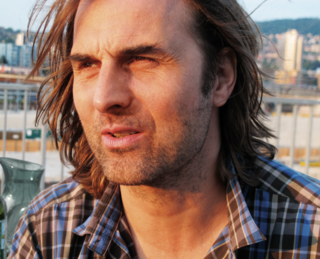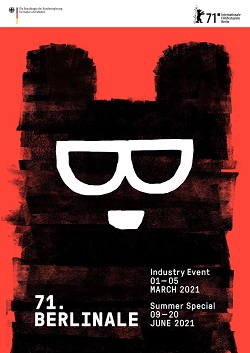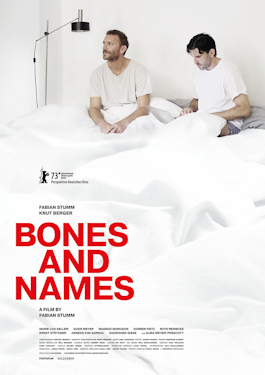
Dieter Kosslick is a German film critic, journalist and researcher. He was the fourth director of the Berlin International Film Festival (Berlinale) from 1 May 2001, when he took over from Moritz de Hadeln, until 2019.

The Teddy Award is an international film award for films with LGBT topics, presented by an independent jury as an official award of the Berlin International Film Festival. For the most part, the jury consists of organisers of gay and lesbian film festivals, who view films screened in all sections of the Berlinale; films do not have to have been part of the festival's official competition stream to be eligible for Teddy awards. Subsequently, a list of films meeting criteria for LGBT content is selected by the jury, and a 3,000-Euro Teddy is awarded to a feature film, a short film and a documentary.

The Berlin International Film Festival, usually called the Berlinale, is a major international film festival held annually in Berlin, Germany. Founded in 1951 and originally run in June, the festival has been held every February since 1978 and is one of Europe's "Big Three" film festivals alongside the Venice Film Festival held in Italy and the Cannes Film Festival held in France. Furthermore, it is one of the "Big Five", the most prestigious film festivals in the world. The festival regularly draws tens of thousands of visitors each year.

The Golden Bear is the highest prize awarded for the best film at the Berlin International Film Festival. The bear is the heraldic animal of Berlin, featured on both the coat of arms and flag of Berlin.

The 37th annual Berlin International Film Festival was held from 20 February to 3 March 1987. The Golden Bear was awarded to the Soviet Union film Tema directed by Gleb Panfilov. The retrospective was in honour of Armenian-American film and theatre director Rouben Mamoulian. The homage was dedicated to French couple Jean-Louis Barrault, actor and director, and Madeleine Renaud, actress. It was titled Renaud-Barrault au cinéma.

Berlin Independent Film Festival (BIFF) is a film festival with a special emphasis on independent films, which annually takes place in Berlin, Germany. It screens German and international films and awards them in various categories. It screens at the historic Kino Babylon, and offers jury awards in many categories as well as two audience awards.

Thomas Imbach is an independent filmmaker based in Zürich, Switzerland. With his production company Bachim Films, Imbach produced his own work until 2007. He then founded Okofilm Productions together with director/producer Andrea Staka. All of his films have been released theatrically and Imbach has won numerous awards for his work, both in Switzerland and abroad. With Well Done (1994) and Ghetto (1997) Imbach established his trademark audio-visual style, which is based on a combination of cinema- verité camera-work and fast-paced editing. His fiction features Happiness is a Warm Gun, as well as Lenz (2006), I Was a Swiss Banker (2007) and the fictive autobiography Day is Done (2011) all premiered at the Berlinale. His latest feature film Mary Queen of Scots celebrated its premiere in Locarno and at the Toronto International Film Festival in 2013. His latest documentary Nemesis celebrated its international premiere at International Documentary Film Festival Amsterdam 2020, where it received the Prize for Best Cinematography. Thomas Imbach is currently considered one of the most unconventional and consistent Swiss filmmakers.

Age of Cannibals is a 2014 German drama film directed by Johannes Naber, starring Devid Striesow, Katharina Schüttler and Sebastian Blomberg. It tells the story of two business consultants who travel to impoverished and corrupt countries where they make shady business deals, never having to leave their hotels. The film is made like a chamber play with stylised and grotesque acting. Principal photography took place from 8 January to 14 February 2013.

The 67th annual Berlin International Film Festival was held from 9 to 18 February 2017 with Dutch filmmaker Paul Verhoeven as President of the Jury. Django, directed by Etienne Comar, opened the festival. The Golden Bear was awarded to the Hungarian film On Body and Soul directed by Ildikó Enyedi, which also served as closing film of the festival.
Berlinale Talents, formerly Berlinale Talent Campus, is the talent development programme of the Berlin International Film Festival. An annual summit and networking platform for 200 outstanding creatives from the fields of film and drama series, the events take place in February at the three venues of HAU Hebbel am Ufer Theatre in Berlin-Kreuzberg. Berlinale Talents is organized and directed by Florian Weghorn as programme manager and Christine Tröstrum as project manager.

Anne Zohra Berrached is a German film director and screenwriter.

The Berlin Bruisers are a gay and inclusive rugby club based in Berlin, Germany. They were founded in 2012, and are the first team of its kind in Germany. Although they are a primarily gay rugby team, the club is open to anyone with an interest in playing rugby and includes members of all sexualities and gender identities. The club is affiliated with International Gay Rugby.

The 69th annual Berlin International Film Festival took place from 7 to 17 February 2019. French actress Juliette Binoche served as the Jury President. Lone Scherfig's drama film The Kindness of Strangers opened the festival. The Golden Bear was won by Israeli-French drama Synonyms directed by Nadav Lapid, which also served as the closing film of the festival.

The 70th annual Berlin International Film Festival took place from 20 February to 1 March 2020. It was the first under the leadership of new Berlin Film Festival heads, business administration director Mariette Rissenbeek and artistic director Carlo Chatrian. The festival opened with the opening gala presented by actor Samuel Finzi followed by the world premiere of the film My Salinger Year which was selected for the Berlinale Special section. The Golden Bear was awarded to the Iranian film There Is No Evil, directed by Mohammad Rasoulof.

Sven Zellner is a German photographer, camera operator and documentary filmmaker.

The 71st annual Berlin International Film Festival took place from 1 to 5 March 2021 as a virtual festival due to the COVID-19 pandemic. An in-person event has also been tentatively scheduled for June, pending the resolution of the COVID-19 issue.
Instructions for Survival is a German documentary film, directed by Yana Ugrekhelidze and released in 2021. The film is a portrait of Alexander, a trans man living in Georgia who must carefully navigate secrecy about his gender identity while he and his wife undertake efforts to migrate to a safer country.

The 72nd annual Berlin International Film Festival, usually called the Berlinale, took place from 10 to 20 February 2022 in person. On 15 December 2021 the first film of the festival was announced. The festival opened with François Ozon's drama film Peter von Kant. Isabelle Huppert was awarded Honorary Golden Bear for lifetime achievement on 15 February 2022 at the Berlinale Palast award ceremony. Her film by Laurent Larivière, À propos de Joan was also screened.

The 73rd annual Berlin International Film Festival, usually called the Berlinale, took place from 16 to 26 February 2023. It was the first completely in-person Berlinale since the 70th in 2020. The festival has added a new award for best television series this year. On 15 December 2022, the first Panorama and Generation titles for the festival were announced, and on 13 January 2023, many world premieres were added to out-of-competition lineup, including Israeli filmmaker Guy Nattiv's Golda—a biographical film about Golda Meir, first female Prime Minister of Israel.

Bones and Names is a 2023 German drama film written and directed by Fabian Stumm in his feature directorial debut, starring himself along with Knut Berger, Marie-Lou Sellem and Susie Meyer. The relationship drama presents subtle irony of the partnership between an actor and an author that turns out to be more vulnerable to crises than expected.


















